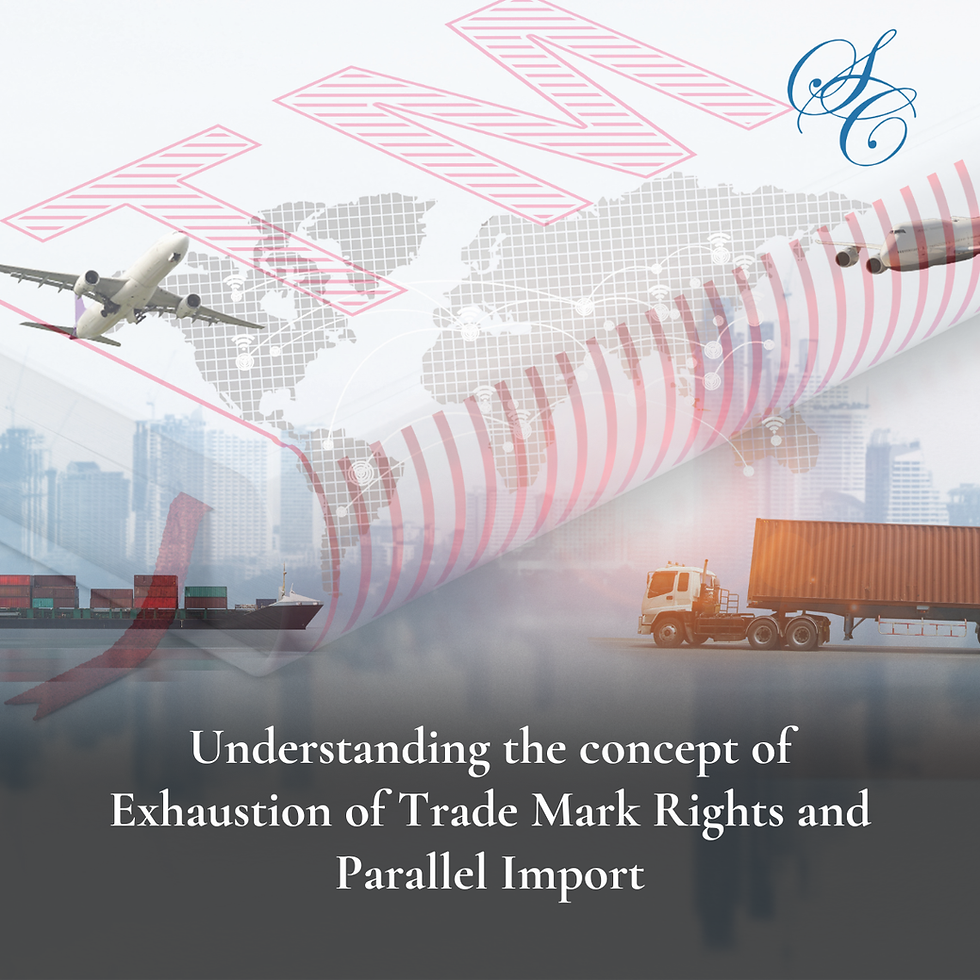From Opinions to Offense: Navigating Trademark Disparagement in the Age of Influence
- SC IP
- May 28, 2025
- 6 min read

In current digital landscape, where transparency is more important than ever, influencers wield significant power—not just to shape trends, but to hold brands accountable. With millions of followers trusting their opinions, influencers have evolved from mere content creators into consumer advocates. However, when an influencer publicly criticizes a brand it often raises questions: are they overstepping boundaries, or simply exercising their right to free speech? As these dynamics become increasingly complex, brand owners are taking a more active role in defending their intellectual property and managing reputational risks.
This growing tension between influencer expression and brand protection has brought legal considerations to the forefront—particularly in the trademark law. In India, where influencer marketing is growing rapidly but lacks specific regulation, courts have begun addressing cases involving trademark disparagement by social media influencers. A key issue that has emerged is the balance between an influencer’s right to free speech and a brand’s right to protect its trademark and reputation. Although the Trade Marks Act, 1999 (the “Act”) does not explicitly define “disparagement”, Black’s Law Dictionary describes it as “a false and injurious statement that discredits or detracts from the reputation of another’s property, products or business”. Influencers may be held liable for trademark disparagement if they make false or misleading claims that damage a brand’s goodwill. In such cases, Indian courts have provided remedies under the broader scope of trademark infringement, reinforcing that freedom of expression does not extend to deceptive or defamatory content.
Although the Act does not lay down a clear standard for distinguishing between trademark disparagement and an influencer’s right to free speech, the introduction of the Advertising Standards Council of India Guidelines, 2023 (“ASCI Guidelines”) for influencer advertising in digital media has added a new layer of accountability. Courts are increasingly seeing brands refer to these guidelines to manage influencer conduct. We’ve explored the scope and significance of the ASCI Guidelines in our article titled “Demystifying Advertising Standards Council of India – Safeguarding Ethical Advertising in India.” Notably, these guidelines outline the responsibilities influencers must uphold when partnering with brands. However, a critical question remains: can these guidelines be used by brands as a basis for legal action in trademark disparagement cases? And how do we determine the threshold where an influencer’s statement qualifies as protected speech under Article 19(1)(a) of the Indian Constitution versus unlawful disparagement?
Even before the introduction of the ASCI Guidelines, the Bombay High Court addressed the issue of trade mark disparagement vs. an influencer’s right to free speech in the case of Marico Ltd. vs. Abhijeet Bhansali[1]. Marico had filed a lawsuit against the defendant, a social media influencer, alleging that his video contained false and defamatory statements about their coconut oil under the brand PARACHUTE. While the decision of the single judge bench of the Bombay High Court, ruling in favour of Marico, was stayed by the division bench in an appeal[2], the single judge bench made some pertinent observations regarding the role of social media influencers. The court had observed that social media influencers are “individuals who have acquired a considerable follower base on social media along with a degree of credibility in their respective space”. The judge emphasized that influencers cannot make statements with the same impunity as ordinary individuals, as their words have a magnified impact on their audience. Consequently, the court directed the defendant to remove the video, highlighting the need for influencers to exercise caution and responsibility in their content creation. However, the division bench was of the view that the statements made by the defendant were merely an expression of opinion. The division bench reasoned that a clear distinction be drawn between ‘facts’ and an ‘expression of opinion’. As per the division bench, no individual can be prohibited from stating factual matters; however, they may be held accountable if they cannot substantiate the facts they claim. The division bench also ruled that when an opinion is based on disclosed and non-defamatory facts, no legal action can be taken.
The Bombay High Court’s ruling in the Marico case (supra) laid important groundwork in defining the responsibilities of social media influencers, even before formal regulations like the ASCI Guidelines were introduced. The court’s emphasis on influencers’ heightened responsibility due to their credibility and influence mirrors the expectations outlined in the ASCI Guidelines. Both the court and the ASCI acknowledge that influencers are not ordinary consumers; their statements can significantly impact brand reputation and consumer perception.
Following the introduction of the ASCI Guidelines, the Delhi High Court addressed their relevance in the case of Zydus Wellness Products Ltd. v. Prashant Desai[3]. Zydus filed a suit against the defendant, alleging trademark infringement and disparagement after he published a video claiming that Zydus’s brand COMPLAN should not be given to children due to its high sugar content. Zydus had, in its submissions, argued that the defendant lacked the necessary medical qualifications to comment on nutritional matters and relied on the ASCI guidelines to support this claim. In response, the defendant maintained that the ASCI guidelines were merely obligatory in nature and are not mandatory, and contended that his video was informative and protected under Article 19(1)(a) of the Constitution. However, the court ruled in favour of Zydus, noting that the defendant had presented no medical evidence or expert opinions to substantiate his claims. The court further emphasized that, in line with the ASCI guidelines, influencers without relevant qualifications should not make health or nutrition related claims. As a result, the defendant was restrained from publishing any content that could amount to trademark disparagement. The judgment clearly demonstrated the court’s willingness to consider the ASCI guidelines in assessing influencer conduct in a trade mark disparagement dispute.
A more recent case that delves into similar issues is San Nutrition Pvt. Ltd. v. Arpit Mangal & Ors.[4] In this case, San Nutrition filed a suit against several influencers, claiming they had made disparaging remarks about their products under the guise of public awareness. San Nutrition sought relief on grounds of trademark infringement and disparagement. However, the Delhi High Court refused to grant an injunction, noting that the defendants had conducted appropriate testing before criticizing San Nutrition’s products. These tests, carried out by accredited laboratories, provided a solid factual basis for their claims. The court further emphasized that the defendant’s comments were made in the public interest and were fair, albeit hyperbolic, rather than defamatory. Regarding the ASCI Guidelines, the court pointed out that the videos in question were not sponsored by San Nutrition and, therefore, did not qualify as “advertisements” under the framework of ASCI Guidelines which is specifically defined as a “paid-for communication”. As such, the ASCI Guidelines did not apply to the defendant. Moreover, the court deemed the defendant’s qualifications irrelevant, since the claims were substantiated by credible test results.
More recent cases, such as Mondelez Foods Pvt. Ltd. & Ors. Vs. Mr. Revant Himatgsingka[5] and Reckitt Benckiser (India) Private Ltd vs. Dr. Manjot Marwah & Ors.,[6] have further underscored the importance of proper due diligence and transparency in influencer marketing.
The above discussion highlights how brands are taking more proactive legal action against influencers who make unsubstantiated claims or disparaging remarks about their products. In these cases, the courts have reinforced that while influencers are entitled to express opinions, they must ensure that these opinions are backed by verifiable facts and are not misleading or defamatory. While influencers play a vital role in shaping public opinion, their power comes with responsibility. The cases discussed, from Marico to San Nutrition illustrate how courts are increasingly holding influencers to higher standards, particularly when it comes to factual accuracy and potential harm to a brand’s reputation.
Although influencer advertising regulations like the ASCI Guidelines are not always directly enforceable in legal disputes, they offer a valuable framework for ethical conduct in the digital space. As the legal landscape continues to evolve, brands and influencers must navigate this space carefully—ensuring that their actions align with both legal obligations and ethical standards, ultimately contributing to a more transparent and responsible digital marketplace.
[1] Marico Ltd. v Abhijeet Bhansali [2020 (81) PTC 244 (Bom)]
[2] Abhijeet Bhansali Vs. Marico Ltd. [2020 SCC OnLine Bom 265]
[3] Zydus wellness products Ltd. Vs. Prashant Desai [CS (COMM) 684/2024]
[4] San Nutrition Private Limited vs. Arpit Mangal and Ors. [CS (COMM) 420/2024]
[5] CS(Comm)884/2024
[6] CS(COMM) 325/2025




Comments